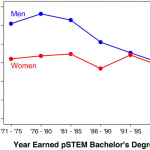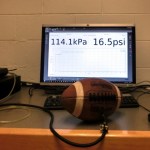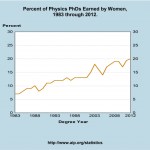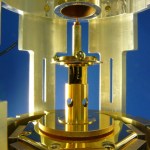In the News
A long-ish stretch of time, but I was basically offline for a bunch of that because I needed to finish a chapter I was asked to contribute to an academic book. So there are only four physics posts from Forbes to promote this time:
-- 'The Expanse' Is A Rare Sci-Fi Show That Gets Simulated Gravity Right: Another post on the SyFy adaptation of "James S. A. Corey"'s books, talking about a nifty bit of visual effects that nods at the Coriolis force you'd see on a rotating space station.
-- What Is The Quantum Pigeonhole Principle And Why Is It Weird?: A paper published in the Proceedings of the…
There's a new Science Express paper on interfering clocks today, which is written up in Physics World, with comments from yours truly. The quote is from a much longer message I sent-- with no expectation that it would end up as anything other than a pull quote, I might add, but I thought the background would be helpful. Since I ended up doing a back-of-the-envelope estimate for that, though, I thought I would reproduce some of the reasoning here.
The basic proposal idea here is to do an atom interferometer inside a Ramsey interferometer for making an atomic clock. That is, before sending the…
The editor at Forbes suggested I should write something about the re-start of the Large Hadron Collider, so I did. But being me, I couldn't just do an "LHC, yay!" post, but talk about it in a larger context, as one of three major approaches to filling the gaps in the Standard Model:
The big physics story over the weekend was the re-start of the Large Hadron Collider at CERN, the world’s largest and highest-energy particle accelerator. It was initially started in 2008, but some key circuits failed shortly after it was switched on. A relatively quick patch job allowed it to operate at half its…
Via Curt Rice (or, more precisely, somebody on Twitter who posted a link to that, but I didn't note who) there's a new study in Frontiers in Psychology of the STEM "pipeline", looking at the history of gender disparities in STEM degrees. You can spin this one of two ways, the optimistic one being "Women now continue on from bachelors degrees to Ph.D.'s at the same rate as men!" and the pessimistic one being, well, Rice's post.
The accurate description, as is often the case in social science, "This stuff is really messy and confusing." Rather than being a set of nice straight pipes going from…
I've done yet another piece for The Conversation, this one expanding on something I've been saying in interviews promoting Eureka: that knowing the process of science can help people sort good science from bad. In this particular case, I take the somewhat #slatepitch-y angle that the recent high-profile unraveling of the BICEP2 experiment's claim to detect primordial gravitational waves is a good thing:
Along with general disappointment, the new announcement has prompted discussion of what, if anything, the BICEP2 team did wrong. Many commentators fault them for over-hyping their results to…
The ending of last night's Super Bowl couldn't've been more perfect as a demonstration of the point I was making about scientific thinking in football (and, you know, in that book I keep flogging...). First, on the positive side, you have New England's Malcolm Butler making the key play:
"I knew what was going to happen," said Butler, an undrafted free agent out of Western Alabama who said New England was the only team that gave him a chance to reach the NFL. "I don't know how I knew. I just knew. I just beat him to the point and caught the ball."
Perhaps Butler knew because he had seen the…
I wrote up another piece about football for the Conversation, this time drawing on material from Eureka, explaining how great football players are using scientific thinking:
Seattle Seahawks cornerback Richard Sherman gets called a lot of things. He calls himself the greatest cornerback in the NFL (and Seattle fans tend to agree). Sportswriters and some other players call him a loudmouth and a showboater. Fans of other teams call him a lot of things that shouldn’t see print (even on the internet). One thing you’re not likely to hear anyone on ESPN call Sherman, though, is “scientist.”
And…
I know I said I was done with this story, but this was actually recorded last week: The Daily Planet show on Discovery Channel in Canada contacted me last week when all this deflated-football silliness was exploding, and got a cameraman to come over and record me talking about it. The episode aired Monday night, January 26th, and you can stream it from their archives at the link above (I think it should be episode 216, but when I looked just now, it was just "Episode 16," but the date is correct. My bit is toward the end, starting around the 35:00 mark, but you should totally watch the whole…
The low-level cold I've been nursing for a month now finally exploded into the full unpleasantness of my usual winter illness Saturday, or else I would've been more active following up on my Deflategate article and my ideal gas law post. As it was, for most of the day, I could barely keep on top of clearing comments from moderation.
Anyway, a few things deserve more prominent responses than a comment at the end of a long post, so:
-- I was in bed during the great Bill Belichick press conference, though I saw some mockery of it come across Twitter. While it may not have played well with the…
So, as mentioned yesterday, I got an email asking me about the weird scandal involving the Patriots and underinflated footballs, so I wrote a piece for the Conversation on the subject. since a few people had beaten me to citations of the Ideal Gas Law, though, I decided to bring my own particular set of skills into this, and did an experiment.
[UPDATE: I've added some follow-up/concluding remarks in a separate post from Sunday 1/25. So, if you care about my reaction to Belichick's big press conference, go over there.]
You can see the basic set-up at the link-- I got a couple of footballs from…
One of the cool things about working at Union is that the Communications office gets media requests looking for people to comment on current events, which sometimes get forwarded to me. Yesterday was one of those days, with a request for a scientist to comment on the bizarre sports scandal surrounding the deflated footballs used in the AFC Championship game this past weekend. Which led to me doing an experiment, and writing a short article for The Conversation:
News reports say that 11 of the 12 game balls used by the New England Patriots in their AFC championship game against the…
If you like arbitrary numerical signifiers, this is the point where we can start to talk about plural dozens of Uncertain Dots hangouts. As usual, Rhett and I chat about a wide range of stuff, including the way we always say we're going to recruit a guest to join us, and then forget to do anything about that.
The video:
Other topics include how it's important to rip up your class notes every so often, the pros and cons of lab handouts/ lab manuals, and of course this week's Nobel Prize in Physics for blue LED's (shameless self-linkage).
I'm crushingly busy right now, largely because I had no…
The 2014 Nobel Prize in Physics has been awarded to Isamu Akasaki, Hiroshi Amano and Shuji Nakamura for the development of blue LED's. As always, this is kind of fascinating to watch evolve in the social media sphere, because as a genuinely unexpected big science story, journalists don't have pre-written articles based on an early copy of a embargoed paper. Which means absolutely everybody starts out using almost the exact words of the official Nobel press release, because that fills space while they frantically research the subject. Later in the day, you'll get some different framing, once…
On Twitter Sunday morning, the National Society of Black Physicsts account retweeted this:
Using Lasers to Lock Down #Exoplanet Hunting #Space
http://t.co/0TN4DDo7LF
— ✨The Solar System✨ (@The_SolarSystem) September 28, 2014
I recognized the title as a likely reference to the use of optical frequency combs as calibration sources for spectrometry, which is awesome stuff. Unfortunately, the story at that link is less awesome than awful. It goes on at some length about the astronomy, then dispenses with the physics in two short paragraphs of joking references to scare-quoted jargon from the…
Over at FiveThirtyEight, they have a number-crunching analysis of the number of papers (co)authored by women in the arxiv preprint server, including a breakdown of first-author and last-author papers by women, which are perhaps better indicators of prestige. The key time series graph is here:
Fraction of women authors on the arxiv preprint server over time, from FivethirtyEight.
This shows a steady increase (save for a brief drop in the first couple of years, which probably ought to be discounted as the arxiv was just getting started) from a bit over 5% women in the early 90's to a bit…
I've gotten a few queries about this "Impossible space drive" thing that has space enthusiasts all a-twitter. This supposedly generates thrust through the interaction of an RF cavity with a "quantum vacuum virtual plasma," which is certainly a collection of four words that turn up in physics papers. An experiment at a NASA lab has apparently tested a couple of these gadgets, and claimed to see thrust being produced. Which has a lot of people booking tickets on the Mars mission that this supposedly enables.
Most physicists I know have reacted to this with some linear combination of "heavy sigh…
Also coming to my attention during the weekend blog shutdown was this Princeton Alumni Weekly piece on the rhetoric of crisis in the humanities. Like several other authors before him, Gideon Rosen points out that there's little numerical evidence of a real "crisis," and that most of the cries of alarm you hear from academics these days have near-perfect matches in prior generations. The humanities have always been in crisis.
This wouldn't be worth mentioning, but Rosen goes on to offer an attempt at an explanation of why the sense of crisis is so palpable within the humanities, an explanation…
Right around the time I shut things down for the long holiday weekend, the Washington Post ran this Joel Achenbach piece on mistakes in science. Achenbach's article was prompted in part by the ongoing discussion of the significance (or lack thereof) of the BICEP2 results, which included probably the most re-shared pieces of last week in the physics blogosphere, a pair of interviews with a BICEP2 researcher and a prominent skeptic. This, in turn, led to a lot of very predictable criticism of the BICEP2 team for over-hyping their results, and a bunch of social-media handwringing about how the…
The latest in a long series of articles making me glad I don't work in psychology was this piece about replication in the Guardian. This spins off some harsh criticism of replication studies and a call for an official policy requiring consultation with the original authors of a study that you're attempting to replicate. The reason given is that psychology is so complicated that there's no way to capture all the relevant details in a published methods section, so failed replications are likely to happen because some crucial detail was omitted in the follow-up study.
Predictably enough, this…
A little while back, I was put in touch with a Wall Street Journal writer who was looking into a new-ish health fad called "earthing," which involves people sleeping on special grounded mats and that sort of thing. The basis of this particular bit of quackery is the notion that spending time indoors, out of contact with the ground, allows us to pick up a net positive charge relative to the Earth, and this has negative health consequences. Walking barefoot on the ground, or sleeping on a pad that is electrically connected to ground via your house's wiring, allows you to replace your lost…





